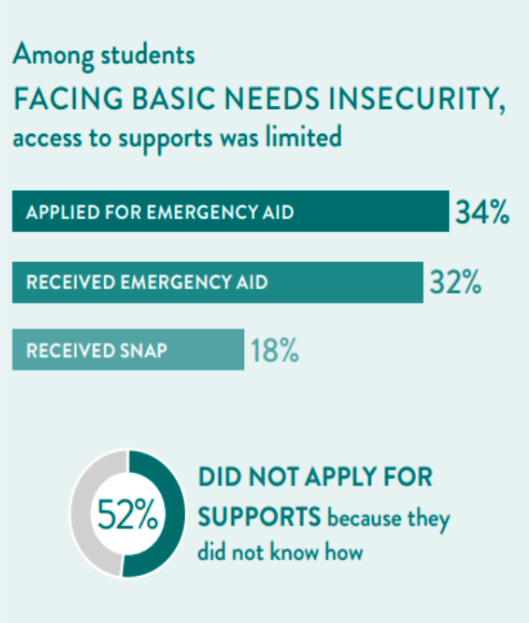BY Stephanie Andrade | former PCC Policy Intern
In addition to the common stress many students experience while enrolling in college and obtaining their degree, students experiencing homelessness face additional barriers to degree completion. Nationally, young adults who experience homelessness are less than one-third as likely to be enrolled in a four-year college as stably housed peers. In Illinois specifically, one study found that one in seven Chicago students experiences homelessness. This is an issue that will further exacerbate inequity in higher education degree attainment, as students who are most at-risk of experiencing basic needs insecurity, including housing, tend to be first-generation students, non-white students, non-binary identifying students, and Pell-grant recipients.

Among the major barriers to college completion that homeless students face is limited access to services. As the chart illustrates, a national survey found that about 52% of students experiencing basic needs insecurity do not apply for assistance because they do not know how to apply. In addition, students often believe they are not needy enough to qualify for support, deterring them from resources. To address some of these barriers homeless students face, Illinois policymakers have taken a step in the right direction by implementing SB 190, Glowiak Hilton’s law.
Glowiak Hilton’s law, which went into effect on August 1, 2022, requires each institution to designate a Housing and Opportunities Useful for Students’ Excellence (HOUSE) liaison. The Liaison responsibilities include developing a plan to provide access to on-campus housing during school breaks, tracking graduation and retention rates, understanding aid, and reporting the number of students using homelessness resources. Centralizing critical information with the appointed liaison will ease access issues students have faced in trying to gather resources from different staff members across campus, but Glowiak’s law will only be effective when supported by funding and implementation directives. Accordingly, the Partnership for College Completion offers policy recommendations that the state and campuses can implement to further build on the efforts of this law.
Reframe Basic Needs
Campuses should increase visibility and awareness of available resources among all students to normalize the use of these resources. Campuses can do this by clearly listing available resources on the school website, in admissions packets, in syllabi, and at orientation, as examples. This will help destigmatize the use of resources that students often feel.
Train Faculty and Staff to Identify, Respond, and Refer Students
Students tend to disclose their situation to faculty when they are experiencing hardship that is affecting their grades or attendance. With that in mind, students would benefit significantly when faculty and staff are trained by the appointed liaison to refer them to the appropriate resources or to the liaison themselves. In fact, students who were met with understanding and who were referred to resources reported that this encouraged retention.
Provide On-Campus Emergency Housing
Campuses can provide homeless students with on-campus shelter, which can be a much more conducive environment for students than shelters open to the general public. As an example, the Massachusetts Department of Higher Education partnered with the Executive Office of Health and Human Services to develop a multi-campus pilot program where the campuses have beds available for homeless students and the campuses are reimbursed by the state for this housing. Corroborating these efforts, community service providers also work with participants to provide counseling, financial literacy, and support in finding permanent affordable housing. By following similar measures in combining the efforts of both the Illinois Board of Higher Education and a state agency, such as Illinois Department of Human Services, Illinois can provide tangible support for homeless students.
Illinois policymakers have taken a step in the right direction by implementing Glowiak Hilton’s law. To further build on this effort of connecting homeless students to the appropriate resources that will support their ability to graduate from college, the state and postsecondary campuses can reframe basic needs, train faculty and staff to aid students, and provide on-campus housing. Implementing these recommendations will further address the inequities students face when they do not have a home.
PCC’s teams are hard at work identifying areas of opportunity for driving policy change that are student-focused and equity-centered and supporting institutions across the state that are implementing evidence-based practices to meet student needs and eliminate disparities in degree attainment. Learn more.

